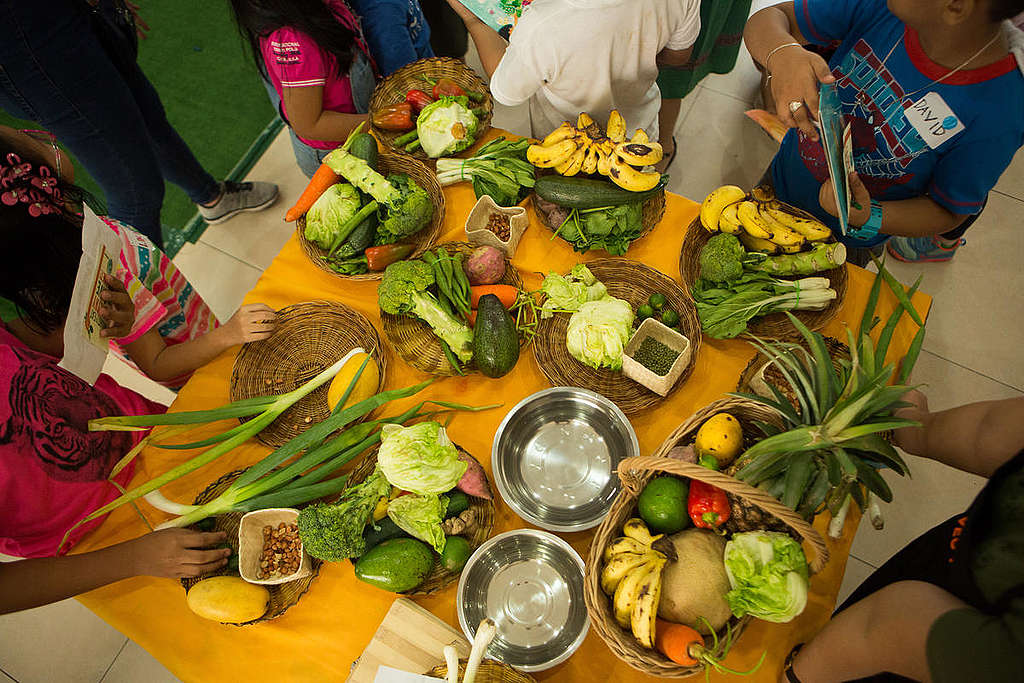Pasig City — Environmental campaigning group Greenpeace and Sikapin Child Development Center today partnered in a children’s health and nutrition event that highlights the connection between the food we eat and the health of our environment.
In a day filled with workshops, discussions and food demos, the event titled, “Sikapin Parents Orientation and Workshop on Healthy Eating” shared with parents insights and options to start getting their children to eat healthier while at the same time contributing towards sustainability of the environment. Sikapin Child Development Center caters to five kindergarten schools located in five barangays in Pasig City.
“Because our diets have largely moved away from healthy fruits and vegetables and towards processed, high-fat saturated food, not only our health, but even that of the planet, are suffering. We hope to give parents and children the chance to discover and enjoy more healthy, delicious options, so that the next generations grow up on healthier diets and a healthier climate,” said Virginia Benosa Llorin, Campaigner, Greenpeace Southeast Asia – Philippines.
Easy to prepare, plant-based meals for school-aged children with easy-to-source ingredients that emphasize locally-grown fruits and vegetables were among the popular information shared during the event. Jake Brandon Andal RND, board director of the Philippine Society of Nutritionist-Dietitian, Inc., and Chef Nancy Dizon-Edralin of Green Leaf Culinaire, were on hand to share their knowledge with around 130 parents and guardians.
Current generations of Filipinos have grown accustomed to fast food fare and processed, canned, imported industrial meats. Aside from the threats to health, Industrial livestock agriculture – raising cows, pigs and chickens in factory farms – also generates as much greenhouse gas emissions as all cars, trucks and automobiles combined [1]. Industrial farming also places local small farmers at a disadvantage and opens them to exploitation. Farmers and fisherfolk remain to be the poorest sectors in Philippine society.
The consumption of industrial meat is one of the major contributors to environmental impacts, including deforestation, water, soil and air pollution, and global heating. A recent Greenpeace report indicates that, if left unchecked, agriculture is projected to produce 52% of global greenhouse gas emissions in the coming decades, 70% of which will come from meat and dairy. To halt the current climate crisis and keep the Paris Agreement on track, global meat and dairy production and consumption must be cut in half by 2050. [2]
In the Philippines, the consumption of meats and eggs has increased, while those of fruits and vegetables continue to decline. Our per capita consumption of fruits (41 grams) and veggies (114 grams per day) is below the World Health Organizations’ 400 grams (combined) per capita per day.
The changes in the dietary patterns of Filipinos may be attributed to several factors: increasing urbanization, associated with increasing Westernized food habits such as high-fat diets, processed foods and consumption of refined carbohydrates; globalization, which increases trade liberalization that favors a wide variety of imported, processed and fast foods over healthier local produce; increased frequency of eating away from home; sedentary lifestyles perpetuated by technology; and the influence of mass media.
Aggressive marketing could also be a culprit. Greater commercial exposure has been found to be associated with positive attitudes towards unhealthy foods.
Studies have shown that the Philippines has a double-burden case of malnutrition that needs to be addressed. To tackle both undernutrition and obesity, more attention needs to be placed on preventive health care and consumer education on healthy nutrition, among others. [3]
Notes:
[1] Less is More: Reducing meat and dairy for a healthier life and planet, Greenpeace International.
[2] Scientific background for the Greenpeace vision of the meat and dairy system towards 2050
Media Contacts:
Virginia Benosa-Llorin
Campaigner, Greenpeace Southeast Asia – Philippines
+639985826617, [email protected]
JP Agcaoili
Communications Manager, Greenpeace Southeast Asia – Philippines
+639498891334, [email protected]

It’s time for an eco-food revolution.
